It's been called a train wreck, a dumpster fire, and the longest year ever — and now, 2020 is finally over. But as much as we'd rather forget it ever happened, 2020 will likely be remembered as a year filled with historic events — many of them timed just when we thought things couldn't get any worse. Here's a look back at some of what's happened over the past 12 months:
January
- Normal for Now: The year began with tech conferences, parties and live performances — nothing to see here.
- Impeachment Trial: The impeachment of President Donald Trump was held on the floor of the U.S. Senate. The vote split nearly along party lines, and the president was acquitted on Feb. 5.
- Death of Kobe Bryant: The retired NBA legend and his daughter were among those killed in a helicopter crash in Southern California.
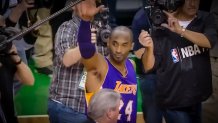
JANUARY: The nation and the sports world were stunned by the death of retired NBA legend Kobe Bryant in a helicopter crash. Bryant was 41 years old.
February
- 49ers Lose the Super Bowl: The 49er Faithful will remember early February as the moment 2020 started to go horribly wrong. The Niners blew a 10-point lead in the 4th quarter, allowing Kansas City to claim the Super Bowl title.
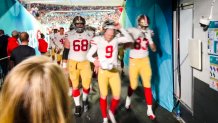
FEBRUARY: The 49er Faithful knew 2020 was headed downhill fast when the team squandered a comfortable 10-point lead in the fourth quarter and handed the Super Bowl title to Kansas City.
March
- A New Virus in Town: We began hearing murmurs about a novel coronavirus spreading rapidly around the world, causing a potentially deadly respiratory illness called COVID-19.
- California Shuts Down: In efforts to slow the spread of the virus, local and state leaders issued stay-at-home orders in mid-March that saw businesses shuttered, streets deserted, and universities scrambling to move classes online.
- Panic Buying: The order to stay at home triggered a rash of panic shopping, leaving store shelves bare. Cleaning supplies became hard to find, but the item in shortest supply across the country was toilet paper.
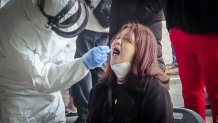
MARCH: A woman is tested for COVID-19, amid brewing panic over the rapidly spreading coronavirus.
April
- Restaurants in Trouble: Restricted to only takeout and delivery, the Bay Area's restaurant industry laid off nearly its entire workforce, leaving chefs and owners to cook alone in their kitchens.
- Virtual Events Become a Thing: From Zoom and FaceTime happy hours, a culture of virtual events emerged that saw musicians and comedians hosting interactive performances online.
- The Debate Over Masks: New health guidelines began to recommend wearing a mask or face covering when out in public. The issue quickly became politicized, and divided the nation.
- Bernie Sanders Drops Out: Though he won California's Democratic primary, Bernie Sanders hadn't fared so well in other parts of the country. He ended his bid for the White House and endorsed Joe Biden as the presumptive nominee.
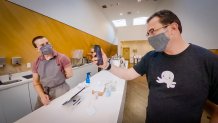
APRIL: Restaurants struggled to survive in take-out-only mode, and many Bay Area governments began requiring that customers wear masks. iPhone owners quickly realized that Face ID doesn't work with a mask on, making Apple Pay less convenient.
May
- Everything's Quiet... Too Quiet: Much of the Bay Area remained shut down as the world quietly moved through springtime and into summery weather. Hikes and socially-distanced park hangouts became the focus of social activities.
- Police Killing of George Floyd: On May 25, George Floyd was killed by Minneapolis police while he was in their custody. Onlookers recorded video of Floyd complaining he couldn't breathe and begging for his life for 8 minutes and 46 seconds while an officer sat with his knee on Floyd's neck.
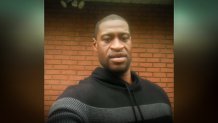
MAY: George Floyd was killed by Minneapolis police while he was in their custody on May 25, 2020.
June
- Black Lives Matter: Protests erupted nationwide in response to the killing of George Floyd. Demonstrators blocked freeways, painted giant murals across city streets, and demanded systemic change to law enforcement, education and other public institutions whose structure can be unfairly stacked against people of color.
- Trump Sends In the Feds: President Trump defended his decision to send in federal police officers to cities where prolonged protests had taken over downtown areas. Protest organizers said the officers were poorly trained and did nothing but escalate the situations.
- Outdoor Dining Begins: Bay Area restaurants got the green light to begin serving food to customers seated outdoors. As life came back to the streets, a flurry of construction saw temporary parklets springing up across neighborhoods, and a regional shortage of patio heaters and propane.
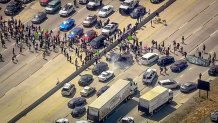
JUNE: In response to the killing of George Floyd, Black Lives Matter demonstrations were staged across the country, including this one that blocked a freeway in San Jose.
July
- Support for Black-Owned Businesses: As a consequence of the widespread demonstrations, a movement emerged to support Black-owned businesses. Food delivery apps highlighted them in special categories on their home screens, and customers went out of their way to order from Claire's Crunch Cake, the only Black-owned food business in the city of San Mateo.
- Silicon Valley Superhero Helps the Homeless: A teen dressed as Batman began anonymously providing help and supplies to his unhoused neighbors in San Jose. He inspired others, including a teen who now dons a Spider-Man costume to help unhoused residents of Cupertino.
- Congressman John Lewis Dies: A civil rights pioneer who was instrumental in the historic march across the Edmund Pettus Bridge in Selma, Louisiana, Lewis was 80 years old when he lost his battle with pancreatic cancer.
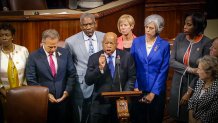
JULY: America said goodbye to U.S. Rep. John Lewis (D-Georgia), a pioneer in the civil rights movement, who lost his battle with cancer at the age of 80.
August
- Back to School: While some private schools experimented with holding classes outdoors, most public schools began the school year with a return to online instruction. A teen-run charity collected used laptops and tablets to help ensure every kid could attend class.
- Presidential Nominations: Joe Biden and Donald Trump were officially nominated as their parties' candidates for president. Biden picked Sen. Kamala Harris (D-California), an Oakland native, as his running mate.
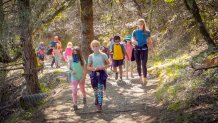
AUGUST: Going back to school looked nothing like normal. While most schools remained online for the start of new school year, a few private schools experimented with holding classes outdoors.
September
- California on Fire: Wildfires raged throughout California, as smoke and haze blanketed the Bay Area for nearly a month. On Sept. 9, the smoke was so thick that the sky remained orange and nearly as dark as night, long into the afternoon.
- Death of Ruth Bader Ginsburg: The 87-year-old U.S. Supreme Court justice who spent her career breaking down barriers to gender equality passed away on Sept. 18 after a long battle with cancer. Her death triggered a race to fill the vacant seat on the court, culminating in the October confirmation of Justice Amy Coney Barrett.
- First Presidential Debate: Candidates Trump and Biden faced off in their first head-to-head debate, punctuated by interruptions, interjections and accusations. Widespread criticism of the debate led to new rules for subsequent debates about when candidates can interrupt each other.
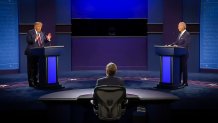
SEPTEMBER: The first presidential debate between Donald Trump and Joe Biden was widely criticized for being peppered with interruptions and interjections, leading to new rules for future debates about when candidates are allowed to interrupt.
October
- Football with Fake Fans: The NFL embarked on its strangest season ever, with many teams playing in empty stadiums. Seats in the end zones were filled with life-sized plastic cutouts of fans, and the league undertook an ambitious project to enhance TV broadcasts with the sounds of fake cheering.
- Early Voting Begins: Voters turned out in record numbers to drop off ballots at early voting centers across the Bay Area.
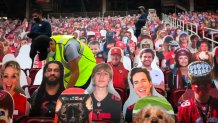
OCTOBER: Football season arrived, with fake fans and fake crowd noise. Here, workers from AAA Flag & Banner install life-sized fan cutouts at Levi's Stadium.
November
- Election Night Suspense: With many jurisdictions straining to count an unprecedented number of mail-in ballots, the Nov. 4 presidential election did not have a clear winner on Election Night. President Trump prematurely declared victory, alleging without evidence that there had been widespread voter fraud.
- Election Called for Joe Biden: After three days of continued counting, multiple media outlets called the election in favor of Joe Biden, and celebrations flooded Bay Area streets. Refusing to concede, President Trump announced his intent to request recounts and file lawsuits in key battleground states. None of those efforts resulted in a change to the election outcome.
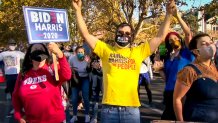
NOVEMBER: After three days of counting votes, multiple media outlets called the presidential race in favor of Joe Biden. Celebrations flooded the streets of Bay Area cities.
December
- The Worst Days of COVID-19: With hospitalizations breaking new records, and ICU capacity rapidly dwindling, state and local authorities issued a new stay-at-home order that mandated the shutdown of dine-in restaurants, salons, museums and other businesses across the Bay Area. Days before the orders were given, Gov. Gavin Newsom, San Francisco Mayor London Breed and San Jose Mayor Sam Liccardo were each observed attending dinner parties that included people from multiple households.
- Vaccines Begin to Arrive: The FDA approved COVID-19 vaccines from Pfizer and Moderna, and the first doses began to arrive in California. Healthcare workers and residents of long-term care homes were among the first to roll up their sleeves. Bay Area scientists assured the public that the new vaccines are safe and will likely remain effective against future mutations of the virus.
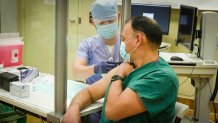
DECEMBER: Vaccines began to arrive in the Bay Area, and healthcare workers publicly rolled up their sleeves to receive the first shots.

